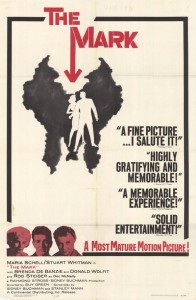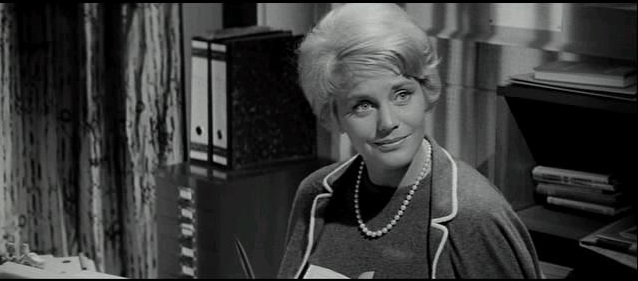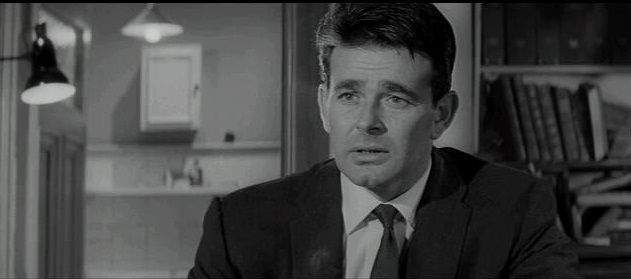|

Synopsis:
A man (Stuart Whitman) imprisoned for intent to molest a ten-year-old girl tries to start a new life for himself, with the help of his psychiatrist (Rod Steiger). Things seems to be looking up for him when he secures a good job and falls in love with a widowed single mother (Maria Schell); however, when a reporter (Donald Houston) writes a story accusing him with intent to abuse Schell’s 10-year-old daughter (Amanda Black), he finds himself damned to relive his past.
|
|
Genres, Themes, Actors, and Directors:
- Ex-Cons
- Falsely Accused
- Maria Schell Films
- Pedophiles
- Psychotherapy
- Rod Steiger Films
Review:
This earnest depiction of a pedophile attempting to live a “normal” life ultimately bites off more than it can chew. Despite featuring fine performances by its two leads (Stuart Whitman and Maria Schell), the movie is done in by its vapid Freudian analysis, a cliched performance by Rod Steiger as Whitman’s Scottish-brogued psychiatrist, and a script which refuses to deal honestly with the messy reality of pedophilia. Unlike in the book it’s based upon, Whitman’s character (Jim) never actually molests a girl here, thus complicating our notion of his guilt; and, because his urges are explained away as stemming from a dysfunctional childhood, we are meant to understand that Jim is truly a “good man” who simply strayed from the path of righteousness.
In the second half of the film, when Jim finds himself the unfair object of a scathing witch hunt, we are clearly meant to sympathize with him — yet it’s difficult to feel warmly towards a pedophile, and thus, our loyalties are divided. If only life were as nice and neat as in the movies, every “Jim” in the world would deserve a second chance, and there would be no need to penalize a sex criminal for his past crimes; unfortunately, however, this is merely wishful thinking. For a much more authentic look at a pedophile struggling with life after prison, see Kevin Bacon in The Woodsman (2004).
Redeeming Qualities and Moments:
- Maria Schell as Whitman’s sympathetic love interest

- Stuart Whitman as the world-weary ex-con

Must See?
No. This dated psychodrama — while daring in its intent — remains an unsatisfying and disappointing film overall.
Links:
|



One thought on “Mark, The (1961)”
A must.
While I understand the points made in the assessment, I don’t think this is primarily a film about pedophilia – mainly because, regardless of what tortures the main character, he (as noted) does not molest anyone. Yes, he abducts a little girl, but when the thought of molestation comes front and center – what does he do?…he throws up; leading the audience to believe he would never actually follow through. The film comes off as more about fear: Whitman’s fear of what he could possibly be capable of; his employer’s fear of his reputation being ruined; Schell’s fear for her daughter; a general fear of what the press can do.
I haven’t seen ‘The Woodsman’ but, as some at imdb.com point out, a clearer view of pedophilia is presented in Solondz’s very peculiar film, ‘Happiness’. The Dylan Baker character is decidedly creepy. Indeed, the pedophiles we see in the news give the immediate appearance of being everything vile.
Whitman does not come across as vile – but deeply troubled by an inability to relate to adult women, whom he has experienced as being taskmasters (something many men fear about women). This inability leads to a fear of one possible, despicable alternative. As he says to Steiger:
“We all know what happens to buried fears, don’t we? They can lead you to pick a fight with someone like Mrs. Leighton just to make sure that you never have to face the test of a normal woman.”
As Whitman’s landlady, Brenda De Banzie presents something of a disturbing take on the unnatural, with her overly maternal manner.
The film also posits the dark territory of the budding sexuality of children. Steiger states: “Just for the record – small girls, even at that age, can be seductive. It’s not usually conscious, but it’s there.”
Most chilling scene: Whitman walks by the playground
While it seems the story is the thing here, I think the performances are all fine. Director Green was somewhat known for handling psychological material (‘A Patch of Blue’, ‘Light in the Piazza’, etc.) – which ultimately led to the somewhat camp-ground of ‘Jacqueline Susann’s Once Is Not Enough’.
cf: Wyler’s ‘The Children’s Hour’, for its depiction of fear and similar subject matter